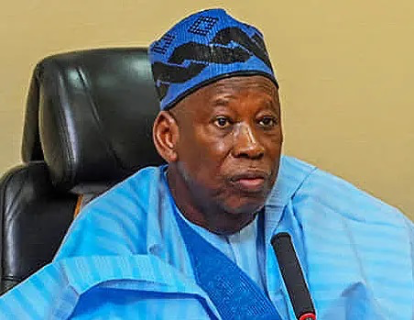
The National Chairman of the All Progressives Congress (APC), Abdullahi Umar Ganduje, has drawn fierce criticism from opposition parties, civil society groups, and political analysts following his comments suggesting Nigeria could transition into a one-party state.
Ganduje, who spoke to State House correspondents after meeting with President Bola Ahmed Tinubu on Friday, insisted that the APC was not actively pushing for a one-party system but argued that if Nigerians overwhelmingly embraced the ruling party, it would be undemocratic to reject them.
His remarks came amid a wave of defections to the APC, including three Kebbi senators—Adamu Aliero, Yahaya Abdullahi, and Garba Maidoki—who switched allegiance after meeting with President Tinubu. Delta State Governor Sheriff Oborevwori, former governor Ifeanyi Okowa, and several National Assembly members have also recently defected, fueling concerns about the erosion of opposition.
The New Nigeria People’s Party (NNPP) in Kano, Ganduje’s home state, condemned his statement as a threat to democracy. NNPP Chairman Hashim Sulaiman Dungurawa said the comments reflected a disregard for democratic principles, emphasizing that true democracy thrives on participation and diversity of opinion.
Dr. Ibrahim Zikirullahi of the Resource Centre for Human Rights and Civic Education described the statement as a symptom of “power intoxication,” warning that civil society would resist any moves toward one-party rule. He reminded the APC that Nigeria’s democracy benefited from robust opposition when the party itself was in the opposition.
Political analysts have warned that one-party dominance could lead to dictatorship and voter apathy. Professor Abubakar Fagge pointed to examples in Uganda and Cameroon where ruling parties weakened democratic checks, noting that Nigeria’s Second Republic collapsed partly due to similar power consolidation attempts.
Prominent socio-cultural groups Ohanaeze Ndigbo and Afenifere also rejected the idea. Ohanaeze’s spokesman Ezechi Chukwu stated that Nigeria’s constitution provides for multi-party democracy, which suits the country’s pluralistic society. Afenifere’s Prince Justice Faloye cautioned against replicating Lagos State’s one-party dominance at the national level, warning of potential consequences for democratic stability.
Despite Ganduje’s comments, the presidency and APC leadership have repeatedly denied pursuing a one-party state. However, the recent wave of defections and Ganduje’s rhetoric have intensified suspicions about the ruling party’s intentions. Former President Goodluck Jonathan recently warned against political manipulation to establish one-party rule, calling it detrimental to Nigeria’s democracy.
As the debate continues, political observers note that the coming months will test whether Nigeria’s opposition can withstand the APC’s expanding influence or if the country is indeed sliding toward a de facto one-party system. The situation raises fundamental questions about the health of Nigeria’s democracy and the balance of power in its political landscape.






